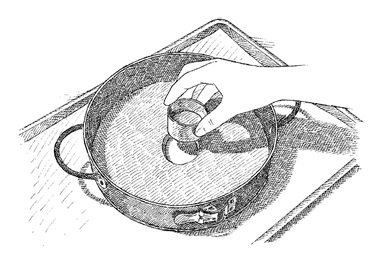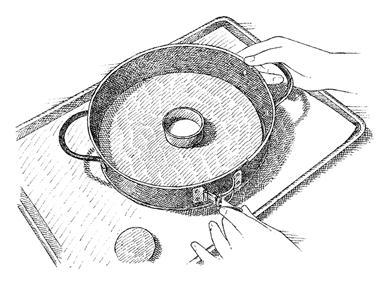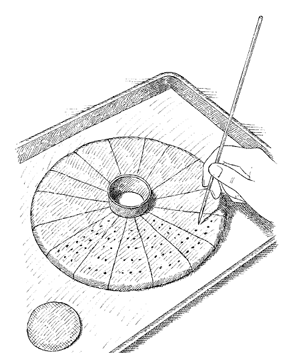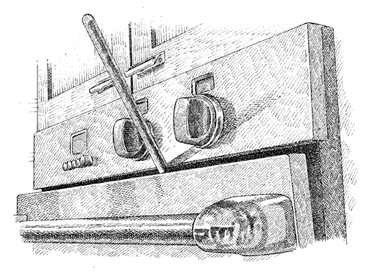The Cook's Illustrated Cookbook (294 page)
Read The Cook's Illustrated Cookbook Online
Authors: The Editors at America's Test Kitchen
Tags: #Cooking

MAKES 16 WEDGES
Use the collar of a springform pan to form the shortbread into an even round. Mold the shortbread with the collar in the closed position, then open the collar, but leave it in place. This allows the shortbread to expand slightly but keeps it from spreading too far. The extracted round of dough in step 2 is baked alongside the rest of the shortbread. Wrapped well and stored at room temperature, the shortbread will keep for up to 1 week.
¹⁄ | cup (1¹⁄ |
1¹⁄ | cups (7¹⁄ |
¹⁄ | cup cornstarch |
²⁄ | cup (2²⁄ |
¹⁄ | teaspoon salt |
14 | tablespoons unsalted butter, chilled and cut into ¹⁄ |
1.
Adjust oven rack to middle position and heat oven to 450 degrees. Pulse oats in spice grinder or blender until reduced to fine powder, about 10 pulses (you should have ¹⁄
4
to ¹⁄
3
cup oat flour). Using stand mixer fitted with paddle, mix oat flour, all-purpose flour, cornstarch, sugar, and salt on low speed until combined, about 5 seconds. Add butter to dry ingredients and continue to mix until dough just forms and pulls away from sides of bowl, 5 to 10 minutes.
2.
Place upside-down (grooved edge should be at top) collar of 9- or 9¹⁄
2
-inch springform pan on parchment paper–lined baking sheet (do not use springform pan bottom). Press dough into collar in even ¹⁄
2
-inch-thick layer, smoothing top of dough with back of spoon. Place 2-inch biscuit cutter in center of dough and cut out center. Place extracted round alongside springform collar on baking sheet and replace cutter in center of dough. Open springform collar, but leave it in place.
3.
Bake shortbread 5 minutes, then reduce oven temperature to 250 degrees. Continue to bake until edges turn pale golden, 10 to 15 minutes longer. Remove baking sheet from oven; turn off oven. Remove springform pan collar; use chef’s knife to score surface of shortbread into 16 even wedges, cutting halfway through shortbread. Using wooden skewer, poke 8 to 10 holes in each wedge. Return shortbread to oven and prop door open with handle of wooden spoon, leaving 1-inch gap at top. Allow shortbread to dry in turned-off oven until pale golden in center (shortbread should be firm but giving to touch), about 1 hour.
4.
Transfer baking sheet to wire rack; let shortbread cool to room temperature. Cut shortbread at scored marks to separate and serve.
Add ¹⁄
2
cup finely chopped toasted pistachios to dry ingredients in step 1. Bake and cool shortbread as directed. Once shortbread is cool, melt 8 ounces finely chopped bittersweet chocolate in microwave at 50 percent power for 2 minutes. Stir chocolate and continue heating until melted, stirring once every additional minute. Stir in additional 2 ounces finely chopped bittersweet chocolate until smooth. Carefully dip base of each wedge in chocolate, allowing chocolate to come halfway up cookie. Scrape off excess with finger and place on parchment paper–lined rimmed baking sheet. Refrigerate until chocolate sets, about 15 minutes.
Turbinado sugar is commonly sold as Sugar in the Raw. Demerara sugar, sanding sugar, or another coarse sugar can be substituted.
Add ¹⁄
2
cup chopped crystallized ginger to dry ingredients in step 1. Sprinkle shortbread with 1 tablespoon turbinado sugar after poking holes in shortbread in step 3.
To toast the oats, heat them in an 8-inch skillet over medium-high heat until light golden brown, 5 to 8 minutes. We prefer the texture and flavor of a coarse-grained sea salt like Maldon or fleur de sel, but kosher salt can be used.
Add ¹⁄
2
cup toasted oats to dry ingredients in step 1. Sprinkle ¹⁄
2
teaspoon sea salt evenly over surface of dough before baking.

1.
Press dough into closed upside-down springform pan collar; smooth with back of spoon. Cut hole in center of dough with 2-inch biscuit cutter; replace cutter in hole.

2.
Open collar. Bake 5 minutes at 450 degrees, then 10 to 15 minutes at 250 degrees.

3.
Score partially baked shortbread into wedges, then poke 8 to 10 holes in each wedge.

4.
Return shortbread to turned-off oven to dry; prop open door with wooden spoon or stick.
![]() WHY THIS RECIPE WORKS
WHY THIS RECIPE WORKS
During the holidays, these French butter cookies offer sophistication and style. That is, if you can capture their elusive sandy texture (sablé is French for sandy), which separates them from sturdy American butter cookies. Most of the sablé recipes we came across had only slight differences in ingredient proportions—but they all baked up without the delicate crumbliness that defines this cookie. To create the hallmark sandy texture of sablés—light, with an inviting granular quality similar to shortbread—we would have to do some detective work. We started with a basic recipe using the typical method of creaming butter and sugar, then adding egg and flour. We then chilled, sliced, and baked the dough—but these cookies were missing the delicate crumbliness that defines sablés. We needed to decrease the liquid in the dough so there would be less moisture to dissolve the sugar particles. Cutting back on butter helped, as did the inclusion of a hard-cooked egg yolk, an addition we came across in our research. Adding the mashed yolk during creaming eliminated moisture and perfected the texture of the cookies. Brushing the cookies with a beaten egg white and sprinkling them with coarse sugar before baking added a delicate crunch and an attractive sparkle.
See “FORMING PRETZEL SABLÉS” illustrations that follow recipe.
See “FORMING SPIRAL SABLÉS” illustrations that follow recipe.
MAKES ABOUT 40 COOKIES
Turbinado sugar is commonly sold as Sugar in the Raw. Demerara sugar, sanding sugar, or another coarse sugar can be substituted. Make sure the cookie dough is well chilled and firm so that it can be uniformly sliced.
1 | large egg |
10 | tablespoons unsalted butter, softened |
¹⁄ | cup plus 1 tablespoon (2³⁄ |
¹⁄ | teaspoon salt |
1 | teaspoon vanilla extract |
1¹⁄ | cups (7¹⁄ |
1 | large egg white, lightly beaten with 1 teaspoon water |
4 | teaspoons turbinado sugar |
1.
Place egg in small saucepan, cover with water by 1 inch, and bring to boil over high heat. Remove pan from heat, cover, and let sit for 10 minutes. Meanwhile, fill small bowl with ice water. Using slotted spoon, transfer egg to ice water and let stand for 5 minutes. Crack egg and peel shell. Separate yolk from white; discard white. Press yolk through fine-mesh strainer into small bowl.
2.
Using stand mixer fitted with paddle, beat butter, granulated sugar, salt, and cooked egg yolk on medium speed until light and fluffy, about 4 minutes, scraping down bowl as needed. Reduce speed to low, add vanilla, and mix until incorporated. Stop mixer; add flour and mix on low speed until just combined, about 30 seconds. Using rubber spatula, press dough into cohesive mass.
3.
Divide dough in half. Shape each piece into log about 6 inches long and 1³⁄
4
inches in diameter. Wrap each log in parchment paper and twist ends to seal. Chill dough until firm, about 45 minutes in freezer or 2 hours in refrigerator.
4.
Adjust oven racks to upper-middle and lower-middle positions and heat oven to 350 degrees. Line 2 baking sheets with parchment. Using chef’s knife, slice dough into ¹⁄
4
-inch-thick rounds, rotating dough so that it won’t become misshapen from weight of knife. Place cookies 1 inch apart on prepared baking sheets. Using pastry brush, gently brush cookies with egg white mixture and sprinkle evenly with turbinado sugar.
5.
Bake until centers of cookies are pale golden brown with edges slightly darker than centers, about 15 minutes, switching and rotating baking sheets halfway through baking. Let cookies cool on baking sheets for 5 minutes; transfer cookies to wire rack and let cool to room temperature.
Reduce flour to 1¹⁄
3
cups and add ¹⁄
4
cup Dutch-processed cocoa with flour in step 2.
Add 4 teaspoons grated lemon zest with vanilla in step 2. Omit egg white mixture and turbinado sugar. Once cookies have cooled, dust with confectioners’ sugar.
Add ¹⁄
3
cup finely chopped toasted sweetened coconut to dough with flour in step 2. Omit turbinado sugar. After brushing cookies with egg white mixture, sprinkle with ¹⁄
3
cup finely chopped untoasted sweetened coconut.
Substitute 1¹⁄
2
teaspoons almond extract for vanilla extract and add ¹⁄
3
cup finely ground sliced almonds to dough with flour in step 2. Omit turbinado sugar. After brushing cookies with egg white mixture, gently press 3 almond slices in petal shape in center of each cookie.
In step 4, slice 1 dough log into ¹⁄
8
-inch-thick rounds, omitting egg white mixture and turbinado sugar. Bake cookies as directed in step 5, reducing baking time to 10 to 13 minutes. Repeat with second dough log. When all cookies are completely cool, microwave 3¹⁄
2
ounces chopped dark or milk chocolate at 50 percent power for 1 to 2 minutes and let cool slightly. Spread melted chocolate on bottom of 1 cookie. Place second cookie on top, slightly off-center, so some chocolate shows. Repeat with remaining melted chocolate and cookies.
Increase vanilla extract to 1 tablespoon and reduce chilling time in step 3 to 30 minutes (dough will not be fully hardened). Slice dough into ¹⁄
4
-inch-thick rounds and roll into balls. Roll each ball into 6-inch rope, tapering ends. Form ropes into pretzel shapes. Proceed with recipe, brushing with egg white mixture, sprinkling with turbinado sugar, and baking as directed.